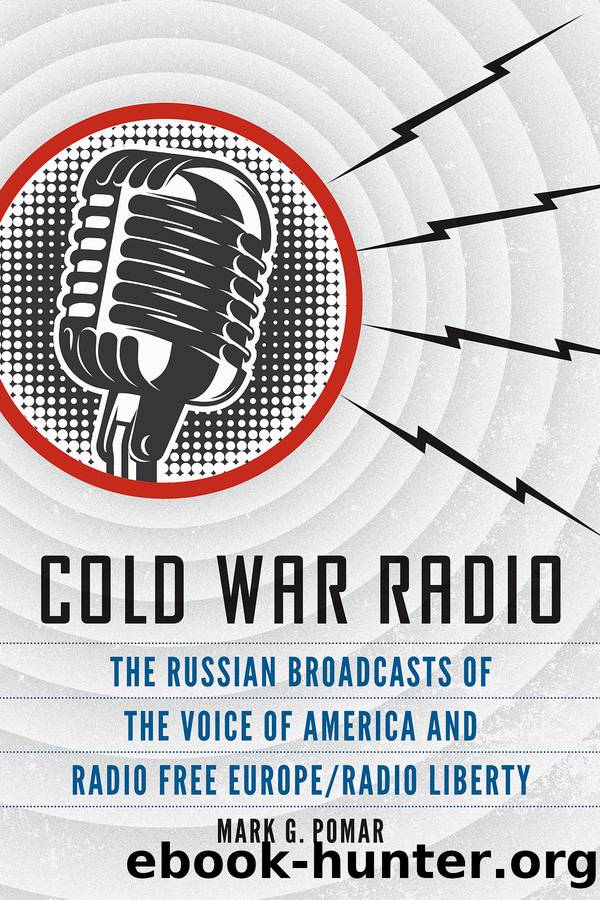Cold War Radio by Mark G. Pomar

Author:Mark G. Pomar [Pomar, Mark G.]
Language: eng
Format: epub
Tags: HIS032000 HISTORY / Russia & the Former Soviet Union, HIS036060 HISTORY / United States / 20th Century, SOC052000 SOCIAL SCIENCE / Media Studies
Publisher: Potomac Books
Solzhenitsyn was so outraged by Pipesâs interpretation of Russian history that he even turned down an invitation to meet with President Reagan, a politician he deeply admired, because Pipes, at the time a member of the NSC staff, would be present.15 Pipes returned the favor by asserting that Solzhenitsyn was unschooled in history and accused him of being an anti-Semitic Russian nationalist who sought to blame communism on Jewish revolutionaries rather than on Russian political culture.
Soon after the publication of Solzhenitsynâs essay, Rahr addressed Pipesâs interpretation of Russian history in two programs. The first, broadcast on July 2, 1980, began with a report on the trial and execution of Marshall Tukhachevsky and the purges of the upper ranks of the Soviet military. Based on Robert Conquestâs book The Great Terror: Stalinâs Purges of the Thirties, this segment painted a graphic picture of Stalinist rule. It was then followed by a report by Boris Shragin, a well-known émigré writer, about a raging debate in émigré circles between those who believed that the Soviet Union was a logical extension of tsarist rule and those who saw it as an aberration, an irreparable rift in Russian history. Shragin reminded his listeners that this topic had been first broached in a samizdat work, Metonoia, that included a Russian translation of the last chapter of Russia under the Old Regime, âTowards the Police State.â This issue provoked heated debate in the Russian dissident community, with several liberals agreeing with many of Pipesâs assertions and the nationalists rejecting the thesis in toto. That debate gained international scope with the publication of Solzhenitsynâs critique in Foreign Affairs, which prompted additional attacks on Pipes by Russian émigrés, principally Vladislav Krasnov, a teacher of Russian at the Defense Language Institute in Monterey, California. In the RL broadcast, Shragin carefully laid out the arguments on both sides, noting that Krasnov merely amplified Solzhenitsynâs emotional response while Pipes reiterated that political cultures evolve over time but are always tied to their past and that new regimes are not simply created ex nihilo. At the conclusion of the piece, Rahr told his listeners that this discussion would be continued in a week and then switched to the last segment of the program, a profile of a liberal Russian reformer, Vasili Krivoshein, who had worked in the latter years of tsarist rule. With a touch of irony, Rahr suggested that perhaps a more thorough understanding of the agricultural reforms introduced by Stolypin and Krivoshein could help to settle the debate between Pipes and Solzhenitsyn.
One week later, on July 9, 1980, Rahr returned to the question of whether Soviet policies and actions were imbedded in Russian political culture or were the product of Communist ideology. He began the program with a short segment on Soviet history, focusing on the fiftieth anniversary of the 16th Party Congress that cemented Stalinâs control over the Communist Party and laid the groundwork for the collectivization of the peasantry. Then Rahr segued to Shraginâs report on the key debate, this time emphasizing Krasnovâs rebuttal of Pipesâs views.
Download
This site does not store any files on its server. We only index and link to content provided by other sites. Please contact the content providers to delete copyright contents if any and email us, we'll remove relevant links or contents immediately.
| Canada | Caribbean & West Indies |
| Central America | Greenland |
| Mexico | Native American |
| South America | United States |
Cat's cradle by Kurt Vonnegut(15295)
Pimp by Iceberg Slim(14464)
4 3 2 1: A Novel by Paul Auster(12354)
Underground: A Human History of the Worlds Beneath Our Feet by Will Hunt(12073)
The Radium Girls by Kate Moore(12001)
Wiseguy by Nicholas Pileggi(5743)
The Fire Next Time by James Baldwin(5409)
Perfect Rhythm by Jae(5382)
American History Stories, Volume III (Yesterday's Classics) by Pratt Mara L(5285)
Paper Towns by Green John(5162)
Pale Blue Dot by Carl Sagan(4981)
A Higher Loyalty: Truth, Lies, and Leadership by James Comey(4937)
The Mayflower and the Pilgrims' New World by Nathaniel Philbrick(4474)
The Doomsday Machine by Daniel Ellsberg(4473)
Killers of the Flower Moon: The Osage Murders and the Birth of the FBI by David Grann(4423)
The Sympathizer by Viet Thanh Nguyen(4370)
Too Much and Not the Mood by Durga Chew-Bose(4319)
The Borden Murders by Sarah Miller(4298)
Sticky Fingers by Joe Hagan(4171)
